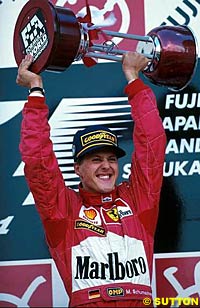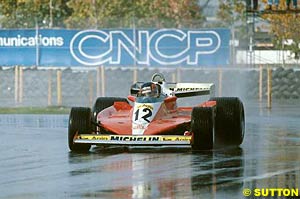
Atlas F1 Magazine Writer
The Japanese Grand Prix has a remarkable history for several drivers and this weekend's race could bring some more memorable achievements. Atlas F1's Marcel Schot brings the statistics and anecdotes ahead of the penultimate round of the 2004 season
The return of Villeneuve didn't give Renault the impulse they were looking for in their battle with BAR. Button and Takuma Sato both finished in the points again, equalling the season best 11 points from Monza to increase their team's lead in the battle for second place to nine points.
In the background, Giancarlo Fisichella is having a remarkable run. After eighth place in Hungary, fifth in Belgium, another eighth in Italy and a seventh place in China, the Sauber driver has now driven in the points in four consecutive races.
For Japan, the focus remains on the battle for second in the Constructors' Championship and to a lesser degree the battle for fourth in the Drivers' Championship. Fernando Alonso is now four points ahead of both Jarno Trulli, who will make his debut with Toyota. Especially Trulli will be poised to do good work for his new team and beat his old teammate in the Championship.
Two of a Kind
The Japanese Grand Prix saw two brothers drive their 100th Grand Prix, five years apart. In 1997 Michael Schumacher reached the landmark, while in 2002 his brother Ralf did the same.
The weekend got off to a slow start for the Ferrari driver as he had to settle for a mediocre tenth position in Friday practice. However, that was still a spot ahead of Villeneuve. On Saturday morning Schumacher didn't make much progress, whereas his Canadian rival did. The Williams driver scored the fifth fastest time, while Schumacher was again tenth.
In the afternoon things greatly improved for Schumacher, but his rival for the Championship beat him in qualifying after all. While Schumacher's lap was impressive, Villeneuve beat him by less than a tenth of a second to make it a front row with the two Championship contenders. However, after qualifying, several penalties for ignoring yellow flags were announced. Both Schumacher and Villeneuve, as well as Heinz-Harald Frentzen, Johnny Herbert and Ukyo Katayama were given penalties. For all but one this meant a suspended race ban. However, Villeneuve was already under a suspended ban and was disqualified without mercy. Williams, however, appealed and Villeneuve was allowed to drive after all.
What followed was quite a surreal race. Schumacher's teammate Eddie Irvine sprinted away from the pack shortly after the start, with Villeneuve keeping Schumacher closely behind him. This lasted until the first set of pitstops, where Schumacher managed to keep ahead of Villeneuve as the Canadian exited the pits. As this happened, Irvine suddenly dropped his pace, let Schumacher by and fended off Villeneuve. This lasted until Villeneuve's second pitstop, after which he wasn't able to pick up the pace from early in the race. Meanwhile, Schumacher only had Heinz-Harald Frentzen to contend with and while his fellow German was the faster man in the final part of the race, Schumacher stayed ahead and won to keep his title chances alive.
Five years later, Ralf Schumacher had to settle for a fifth place on the grid, which was quite the normal thing for Williams then. Ahead of him were both Ferraris and McLarens and next to him on the third row was his teammate Juan Pablo Montoya.
At the start on Sunday, Ralf made his way past Kimi Raikkonen in the McLaren to climb up to fourth right away. After just seven laps this became third as the other McLaren, of David Coulthard, retired from the race. With the Ferraris long gone, Schumacher was effectively the leader of the rest. While Raikkonen followed closely until the first round of pitstops, Schumacher managed to strike a gap of ten seconds before the second round of pitstops commenced, securing his podium position. However, disaster struck with only four laps to go when the Williams' engine failed.
This Weeek in History
This week it's 26 years ago that Gilles Villeneuve won his home Grand Prix in Montreal.
In the second session conditions were better but it was still a Ferrari one and two with Reutemann leading. Gilles had closed the gap to six tenths, but behind him Mario Andretti had squeezed ahead of Stuck with his Lotus, now only half a second behind Villeneuve. When it finally dried up on Saturday afternoon, Friday's work was obsolete and Ferrari's dominance gone. Reutemann was disappointed in 11h place, but Gilles put up a good show and in the end only found Jean Pierre Jarier in the Lotus and Jody Scheckter in the Wolf ahead of him.
In Sunday's race Villeneuve became a victim of a bad start by Scheckter, allowing Williams driver Alan Jones past from fifth place into second. Jarier ran away into the lead with Scheckter recovering in time to stay third ahead of Villeneuve. It lasted until lap 17 before anything changed at the front. Jones was driving around with what appeared to be a slow puncture and gradually lost more and more ground, having to let Scheckter past after 17 laps and Villeneuve a lap later.
Gilles put the pressure on Scheckter and eight laps later reaped the reward, by outbraking the South African in the hairpin and moving into second place, much to the appreciation of the crowd. Now the hunt for Jarier was on, but the gap was big. When Villeneuve moved into second place, he was a massive 30 seconds behind the Frenchman. However, bit by bit the lead shrunk as Villeneuve gave it his all. Halfway through the race the lead started to shrink even faster as Jarier ran into brake problems and after 49 laps retirement became a fact for the disillusioned Lotus driver. The crowd erupted into wild cheers, not to celebrate the misfortune of Jarier, but to celebrate the new leader, Gilles Villeneuve.
With Scheckter a long way behind, Villeneuve was ordered to take it easy on the car in the remaining laps. The Canadian did as he was told, but reluctantly, explaining later that he absolutely did not like having to drive like an old woman. However, he fought to keep his concentration and held on to his lead to take the chequered flag victorious as the first winner of the Canadian Grand Prix in Montreal. To achieve his first victory in his home Grand Prix was something very special.
And all of a sudden Michael Schumacher appeared to be human. It certainly looked different: 20th on the grid, finished 12th. Both the worst grid position and the worst finishing result in the German's career. Everything was different in China. Rubens Barrichello won for the second time in a row, half of the point scorers were younger than 25 years and the four oldest drivers finished outside the points. The facts that Jacques Villeneuve and Schumacher were battling for 11th, while Jenson Button and Kimi Raikkonen were dueling for second seemed the ultimate sign of the turn of the generations.
 When Michael Schumacher came to Japan in 1997, he had far more pressing matters to attend to than celebrating his 100th race. The German was nine points behind Jacques Villeneuve in the Championship with two races to go.
When Michael Schumacher came to Japan in 1997, he had far more pressing matters to attend to than celebrating his 100th race. The German was nine points behind Jacques Villeneuve in the Championship with two races to go.
 With the Grand Prix moved from the old Mosport to the new Montreal track, and the always spectacular local hero Villeneuve in the legendary red of the Scuderia Ferrari, the Canadians came to the track in masses. On Friday they had to endure the rain, but were rewarded with a blistering show from their country man and his teammate Carlos Reutemann. In the morning, the two Ferrari's were miles ahead of the rest of the field. The only disappointment was that Reutemann was 1.5 seconds faster than Gilles, who in turn was 1.8 ahead of number three, Hans Joachim Stuck.
With the Grand Prix moved from the old Mosport to the new Montreal track, and the always spectacular local hero Villeneuve in the legendary red of the Scuderia Ferrari, the Canadians came to the track in masses. On Friday they had to endure the rain, but were rewarded with a blistering show from their country man and his teammate Carlos Reutemann. In the morning, the two Ferrari's were miles ahead of the rest of the field. The only disappointment was that Reutemann was 1.5 seconds faster than Gilles, who in turn was 1.8 ahead of number three, Hans Joachim Stuck.
|
Contact the Author Contact the Editor |
Please Contact Us for permission to republish this or any other material from Atlas F1.
|
Volume 10, Issue 40
Articles
Interview with Giancarlo Fisichella
Sayonara Oli
2004 Japanese GP Preview
2004 Japanese GP Preview
Japanese GP Facts & Stats
Columns
The F1 Trivia Quiz
Bookworm Critique
On the Road
Elsewhere in Racing
The Weekly Grapevine
> Homepage |